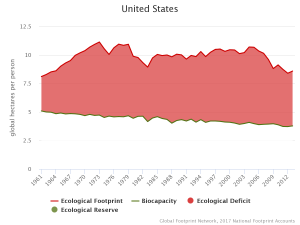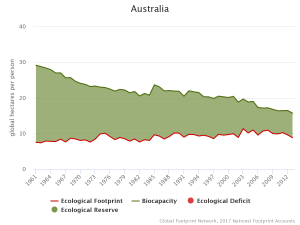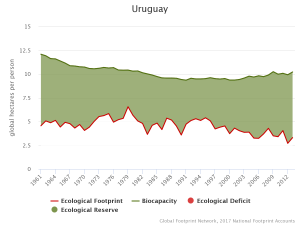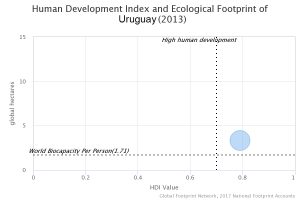OAKLAND, CA, April 5, 2017—Ecological Footprint data for over 200 countries is now freely available, searchable and usable at Ecological Footprint Explorer, the new open data platform that Global Footprint Network launches on April 5 at data.footprintnetwork.org.
By offering researchers, analysts, and decision-makers a new and deeper way to interact with, and download, Ecological Footprint data, Global Footprint Network, an international research organization, aims to amplify its ability to change how the world manages its natural resources and create a sustainable future.
“We live on one planet with limited natural resources. That’s a reality we need to carefully track and address if we’re serious about fulfilling the global commitments of the Paris Climate Accord and the Sustainable Development Goals,” said Mathis Wackernagel, co-inventor of the Ecological Footprint and CEO of Global Footprint Network.
The core of the organization’s work is the Ecological Footprint metric, which compares human demand on nature to what the planet can renew.
Global Footprint Network will hold two webinars, on April 5 and 6, to present and explain the new open data platform. To register, visit www.footprintnetwork.org/webinar.
A formal launch event will be held in San Francisco on April 27. Thought leaders from Google Earth, Aclima, Capgemini, data.world, and the City of Oakland will join a panel discussion on the crucial role of data in taking action to effectively advance sustainability.
National Footprint Accounts 2017
The launch of the Footprint Explorer coincides with the release of Global Footprint Network’s National Footprint Accounts (NFAs) 2017 Edition. Every year, the organization produces a new edition of its NFAs, which track the evolution of the Ecological Footprint of more than 200 countries from 1961 to the present. Based on approximately 15,000 data points per country per year, this data has been used to influence policy in more than a dozen countries, including Ecuador, France, Germany, Japan, Korea, the Philippines, Russia, Switzerland, and the United Arab Emirates.
“The Ecological Footprint is a critical tool for ensuring that we mitigate and adapt to climate change while also preserving the integrity of our vital natural resources and protecting our country from future risk,” said the former President of the Philippines, Benigno Aquino II.
The 2017 NFAs, based on 2013 data (latest UN data available), incorporate the latest carbon emissions data from UN statistics, including from the International Energy Agency.
Highlights from NFA2017 include:
- The US per capita Ecological Footprint fell nearly 20% between 2005 (a peak) and 2013, amounting to the single largest total Footprint reduction for any country over the same period—that reduction is equivalent to Germany’s total 2013 Ecological Footprint. This significant shift, which includes a post-recession pick up, is associated mostly with decreasing carbon emissions and, to a smaller extent, lower forest Footprint likely related to the recession and housing market decline, and trade. US per capita GDP grew about 20% over the same period, making the USA a compelling case of decoupling (with economic growth and natural resource consumption following opposite trends).

- Australia’s per capita Ecological Footprint fell 22% between 2003 and 2013. This can be mostly attributed to a carbon Footprint decrease. Explanations include a drop in household electricity demand in 2010, possibly due to energy standards on appliances and increasing electricity prices. Furthermore, the carbon pricing system enacted by the Labor Party is concomitant with the carbon Footprint drop observed from 2012 to 2013. We look forward to seeing economists and energy policy experts in Australia use our data and provide a more detailed analysis, potentially drawing useful lessons for future policy making.

- Uruguay has been able to gradually and consistently lower its Footprint per capita since 1995 while increasing its Human Development Index (HDI) from Medium-High to currently on the cusp of Very High, due to continual increases in life expectancy (health), education and gross net income per capita. It remains to be seen how Uruguay’s National Energy Policy (implemented in 2010), which promotes biofuels and wind energy generation, will impact the decrease of the Footprint going forward, and whether the country will reduce CO2 emissions from the transportation sector, which is still mostly petroleum-based. Since the downward trend in Footprint started 15 years before the Energy Policy implementation, other factors than renewables have obviously been at work behind the Footprint’s downward trend. We’re look forward to experts and analysts picking up this data as an area of research to reveal the reasons underlying Uruguay’s Ecological Footprint’s consistent decline, and to provide useful analysis for future policy making in Uruguay and in other countries around the world.

About Global Footprint Network
Global Footprint Network is a research organization that is changing how the world manages its natural resources and responds to climate change. Since 2003 we’ve engaged with more than 50 nations, 30 cities, and 70 global partners to deliver scientific insights that have driven high-impact policy and investment decisions. Together, we’re creating a future where all of us can thrive within our planet’s limits.
Media Contacts:
Ronna Kelly – California, United States
Director of Communications and Marketing
Global Footprint Network
+1 (510) 839-8879 x 302 (PDT = GMT-7h)
+1 (510) 834-2563 (mobile)
ronna.kelly@footprintnetwork.org
Laetitia Mailhes – California, United States
Media & Outreach
Global Footprint Network
+1 (415) 794-2884 (PDT = GMT-7h)
laetitia.mailhes@footprintnetwork.org
Helena Brykarz – UK from April 5-7
Director, Operations
Global Footprint Network
+1 (510) 593-3302
helena.brykarz@footprintnetwork.org



